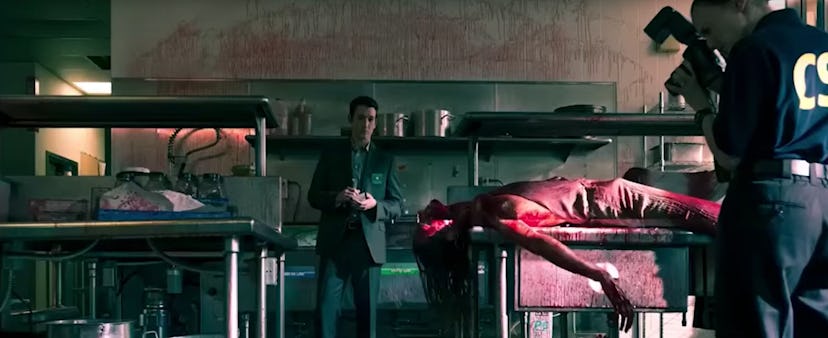Ten 90-Minute Episodes of Miles Teller’s Amazon Show? No One Asked For That

Forget “Peak TV” and “The Golden Age.” In truth, television can be roughly divided into two eras: one where TV was your preferred method of avoiding actual homework or other responsibilities, and one when trying to keep up with TV started to feel like a responsibility in and of itself. The amount of content, distributed out over so many apps, subscriptions, and devices as it is, is already paralyzing in and off itself, and the hyperactive media cycle (both social and traditional) around it only adds to the intensity. “We NEED To Talk About This Season Finale!” No we don’t, I didn’t even watch the first episode yet! “Did You Catch All The Easter Eggs in Season 2?” I most certainly haven’t. I didn’t even go into the fridge and find the regular eggs yet. “If You’re Not Watching This You’re Basically Problematic!” Ok, it premiered yesterday and I’ve had friends in town this week, settle down.
Watching television has not only never felt like so much of a duty, but also one I’m expected to, well, actually think about and actively partake in, rather than, well, just passively pay attention to while it’s on in the background. Which might also be why I now check out episode lengths with the same kind of dread with which I flipped to the last page of an assigned novel in school to clock how many pages it is. Promise me a show with breezy episodes of 30 minutes or less each, and I’m clicking play like an idiot without a care in the world. Give me anything approaching 60 minutes or more and I’m checking my calendar two weeks in advance, and might just decide to skip TV completely that night and go to bed early just to spite these show creators so greedy for my time (Westworld season 2 was particularly great for my sleep schedule).
It seems like streaming services are finally getting hip to this particular anxiety. Shows like Russian Doll, Homecoming, and Maniac have all kept themselves to relatively trim episode run times with many episodes coming in at 30 minutes or less. Yet, the lesson isn’t sinking in industry wide.
Fresh off The Romanoffs, Matt Weiner’s 90-minute-per-episode follow up to Mad Men and perhaps the biggest flop of the streaming era, Amazon is set to debut director Nicolas Winding Refn‘s Miles Teller-starring Too Old To Die Young later this year, and word has just arrived that the thing will not be so much a show, but, sigh, something closer to a 900-minute movie split up in between 10 episodes of 90 minutes each.
“For me the biggest change is just the endurance to do what I think of as a ten-hour movie—or a 16-hour movie in the case of ‘Too Old To Die Young,’” the show’s composer, Cliff Martinez, said in an interview with ScreenDaily. “It’s ten episodes that are around 90 minutes a piece. I warned Nic Winding Refn, you better drink a lo of coffee and get a lot of sleep when you can.”
Nice of him to worry about the director’s sleep schedule, but did anyone think about the viewers? This is all the more disappointing because of the fact hat Refn’s best known actual movie, Drive, is only 100 minutes (it is also entirely cruel to only give 100 minutes of Ryan Gosling, but 900 of Miles Teller).
The teaser trailer for the project looks promising, but also seems to confirm this will also be the sort of high production-value program that will absolutely demand our full attention for all 16 hours of its runtime.
Which, even more than the scheduling we do in our head before clicking play, may be the most exhausting thing about extra-long episodes of prestige TV.
With old episode of Law and Order or Friends you could space out for a few minutes and not miss much. We all knew that the surprise twist conviction or Ross and Rachel moment wasn’t coming until towards the end of the episode anyway. There was a rhythm we understood.
In the age of “prestige TV” there is no expected structure. At any moment the show could demand your attention by running subtitles over fantasy characters speaking some made up language, or the director could drop some tiny little clue whose significance isn’t immediately apparent but becomes integral to your understanding of the series as it unravels (“Ah, it was the grandfather’s right army boot in Season 3, Episode 12 that was the key to the mystery all along!”). Or, worst of all, you could miss that five-second shot of HBO-worthy sexiness that the creators put in to remind you, in so many words, “You’re not watching regular television, you’re watching mature television for artsy adults which utilizes tasteful nudity integral to the story, and you love it.” (We do love it, and we don’t want to miss it.)
Too many TV producers get high on their own ideas, and forget they’re creating for a medium many of us watch in pajamas while sending memes to the group text with our phone in one hand and Instagram stocking a crush on our laptop with the other. Yes, great programs can get us to close the laptop and drop our phone, but we’re not necessarily conditioned to do so. Ease us into it. Earn our trust. Trick us if you have to, or, frankly don’t demand so much of our time upfront in the first place.
Ten Miles Teller-starring mini-movies is a whole lot to ask of a public that barely wanted Miles Teller movies in the first place, you know?